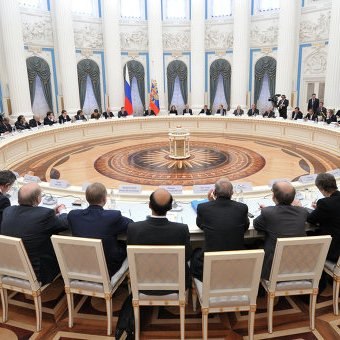With Moscow closing one policy pathway after another—no participation in the European Neighborhood Program, no common approach to managing the Ukrainian energy system, no dialogue on human rights, no joint position on Syria, no ratification of the “third energy package,” no cooperation on the Meseberg initiative, and the list goes on—Berlin tries to contrive new ways of engaging Moscow.
The political reality is rather harsh—statistically, a majority of Russians are not supportive of a liberal agenda, but German diplomacy is eager to keep developing new channels of communication with Russia. That this diplomatic derby requires a lot of creativity was made clear at the meeting of the Egon Bahr fellows—a group of young Russian and German policy thinkers—with Franz Thoennes, a member of the Bundestag in charge of Russia policy.
One opportunity mentioned could be within the framework of the 2018 FIFA World Cup football championship, which will take place in a dozen Russian cities—perhaps a plethora of politically relevant issues could be discussed (ecology, “green” economies, security, effective city management, tolerance, diversity, etc.). Thoennes mentioned that Germany has already established working contacts with the football organizational committee.
Another opportunity could be the forthcoming G20 summit in St. Petersburg (Russia currently chairs the G20), where broad and substantial issues, such as great power and global governance, could be discussed. Limiting G20 discussions to technical matters, as the Kremlin would certainly prefer, is too narrow an approach.
The very existence of the Egon Bahr program, as well as similar programs like the Federal Chancellor Fellowships, and the activities of multiple German foundations, such as Friedrich-Ebert-Stiftung, is a clear indication that Germany has strong soft power resources and is interested in fostering civil society dialogue with Russia.
Within Russian society, there is an adequate appreciation of the West as a place for better education, attractive tourist services, quality medicine, safe banking, top-level merchandise, etc., all in contrast with, as one of the conference participants mentioned, the Kremlin’s need of artificially constructing external enemies to justify its increasingly repressive rule.
In dealing with Russia, the German political class believes in two ideas. One is grounded in the traditions of Jurgen Habermas: communicative power is a transformative force. Another is based on the experience of the Cold War—changes can be made through commerce, which fully corresponds to one of the key premises of the (rather old) theory of modernization. Of course, this position may be questioned not only academically, but on political grounds as well—some Russians deem that German money support the repressive regime in the Kremlin.
Yet some of the German fellows were critical as well, claiming, for example, that Berlin's policies toward Moscow in recent years have been feeble and indecisive. Perhaps, this impression is due to the preponderance of Great Britain and France in Europe’s hard security issues. But Germany compensates this by taking the lead in trying to develop a real and robust Eastern policy, doing a job that no one else in the EU is eager to deal with.
Andrey Makarychev is a professor at the Institute of Government and Politics, University of Tartu, blogging for PONARS Eurasia on the Russia-EU neighborhood.









